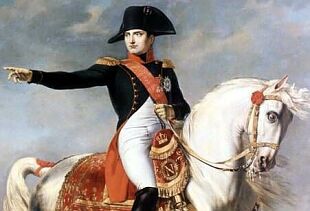(Napoleon Bonaparte)
Emperor of the French
* August 15, 1769 Ajaccio, Corsica + May 5, 1821
Start• 2 • 3 • 4 • 5 • 6 • 7 • 8 • 9 • 10 • 11 • 12 • 13 • 14 • 15 • 16 • Frm• Home •

Known for Conquering a large part of Europe and did much to modernize the nations he ruled.
Instituting French governmental reforms, granting civil rights, and reforming administrative and judicial systems.
Napoleon was born on August 15, 1769, in Ajaccio, Corsica, and was given the name Napoleone (in French his name became Napoleon Bonaparte). He was the second of eight children of Carlo (Charles) Buonaparte and Letizia Ramolino Buonaparte, both of the Corsican-Italian gentry. Napoleon spoke French with a strong Italian accent. No Buonaparte had ever been a professional soldier. Carlo was a lawyer who had fought for Corsican independence, but after the French occupied the island in 1768, he served as a prosecutor and judge and entered the French aristocracy as a count. Through his father's influence, Napoleon was educated at the expense of King Louis XVI, at Brienne and the École Militaire, in Paris. Napoleon graduated in 1785, at the age of 16, and joined the artillery as a second lieutenant. After the Revolution began, he became a lieutenant colonel (1791) in the Corsican National Guard. In 1793, however, Corsica declared independence, and Bonaparte, a French patriot and a Republican, fled to France with his family. He was assigned, as a captain, to an army besieging Toulon, a naval base that, aided by a British fleet, was in revolt against the republic. Replacing a wounded artillery general, he seized ground where his guns could drive the British fleet from the harbor, and Toulon fell. As a result Bonaparte was promoted to brigadier general at the age of 24. In 1795 he saved the revolutionary government by dispersing an insurgent mob in Paris. In 1796 he married Joséphine de Beauharnais, the widow of an aristocrat guillotined in the Revolution and the mother of two children.
|
Napoleon was actually granted sovereignty over the island of Elba during his first exile. A brilliant military commander, Napoleon repeatedly defeated military forces superior in size to his own. Napoleon maintained many of the egalitarian principles of the French Revolution, including equality before the law and freedom of religion. Napoleon created French satellite kingdoms in Holland, Italy, Germany, and Spain, and placed his brothers and other relatives on their thrones. The army assembled by Napoleon in 1812 was the largest yet seen in Europe. Though tradition called for the pope to crown the emperor, Napoleon took the crown from Pope Pius VII's hands and placed it on his own head. |
by Mauro ©